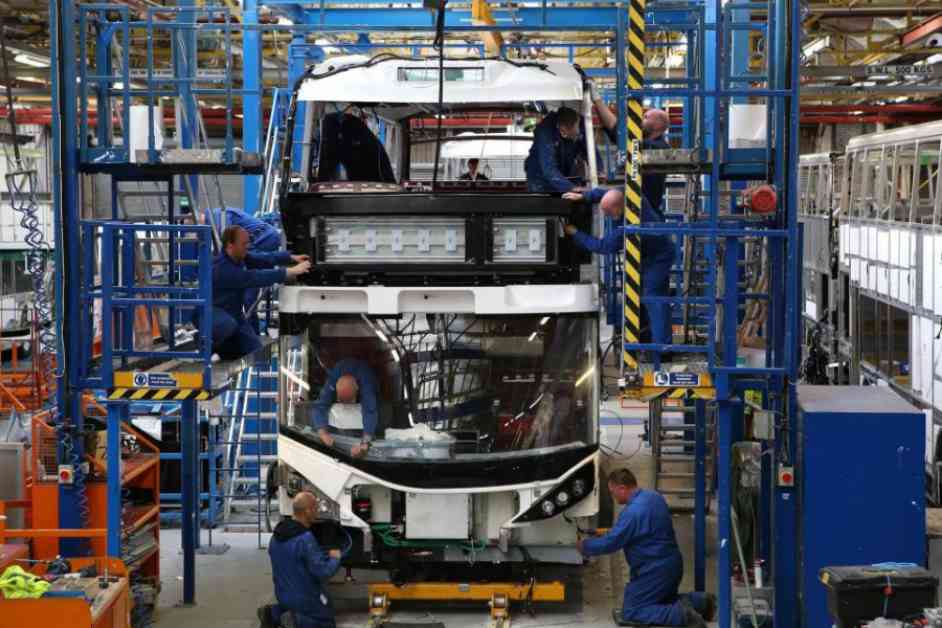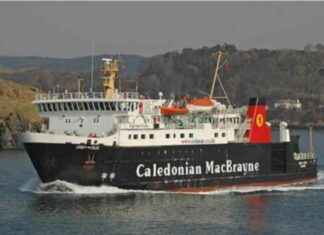Around 160 jobs are in jeopardy at a Falkirk-based bus manufacturer, Alexander Dennis, due to what the company describes as an “uneven playing field” in the industry sector. The company announced this afternoon that a consultation process has been initiated due to concerns over the government’s zero-emission bus funding, which they believe is disproportionately benefiting competitors with lower labor costs.
Alexander Dennis, owned by Canadian manufacturing company NFI Group Inc, employs approximately 1,950 people in the UK and 6,350 people in the domestic supply chain. The Larbert-based factory is the group’s largest in the UK.
The company acknowledges that there are record levels of funding available for zero-emission buses from both the UK and Scottish governments. However, they feel disadvantaged by policies that they believe undermine British bus manufacturers. They argue that the funding criteria do not prioritize companies that adhere to Fair Work First standards, putting domestic manufacturers at a competitive disadvantage.
Managing Director Paul Davies expressed his disappointment with the situation, attributing the threat to jobs to government policy. He emphasized the need to level the playing field to protect jobs and drive investments in local industries.
Unite the Union responded to the news, expressing concerns about the impact on the local community and workers. They demanded meetings with both the company and the Scottish Government to address the issues and seek solutions to protect jobs and promote green manufacturing.
As discussions and consultations continue, the future of the Falkirk bus manufacturing factory remains uncertain, with employees and stakeholders anxiously awaiting decisions that will determine the fate of the 160 at-risk jobs.
Challenges in the Bus Manufacturing Industry
The bus manufacturing industry faces numerous challenges, including increasing competition, evolving technologies, and changing government policies. Companies like Alexander Dennis must navigate these complex dynamics to remain competitive and sustainable in the market.
One of the key challenges highlighted by Alexander Dennis is the disparity in government funding for zero-emission buses. While the funding is aimed at promoting green technologies and reducing carbon emissions, the criteria for distribution may inadvertently disadvantage domestic manufacturers. This issue raises questions about the effectiveness and fairness of government policies in supporting local industries and creating a level playing field for all stakeholders.
Furthermore, the impact of global supply chains and international labor costs adds another layer of complexity to the bus manufacturing sector. Companies operating in different countries may have cost advantages that make it difficult for domestic manufacturers to compete on price. This disparity can influence purchasing decisions by bus operators and ultimately affect the viability of local production facilities.
Implications for Local Communities
The potential loss of 160 jobs at the Falkirk bus manufacturing factory has significant implications for the local community. Beyond the immediate impact on employees and their families, job losses can have ripple effects on the broader economy and social fabric of the region.
Unite the Union’s response underscores the seriousness of the situation and the need for urgent action to address the challenges facing the industry. The union’s demand for meetings with company management and government officials reflects a shared commitment to finding solutions that protect jobs and support sustainable manufacturing practices.
The closure or downsizing of the Falkirk factory would not only impact the workers directly employed at the site but also suppliers, service providers, and other businesses that rely on the factory’s operations. The loss of skilled jobs in the manufacturing sector can have long-term consequences for the local economy, leading to decreased consumer spending, lower tax revenues, and reduced overall economic activity.
Looking Towards a Sustainable Future
In the face of these challenges, it is essential for stakeholders to come together to find innovative solutions that support the growth and sustainability of the bus manufacturing industry. Collaboration between government, industry, labor unions, and local communities is crucial to overcoming obstacles and building a more resilient and competitive sector.
Investing in green technologies, promoting fair trade practices, and strengthening domestic manufacturing capabilities are critical steps towards creating a more sustainable future for the bus manufacturing industry. By aligning policies and priorities to support local businesses, governments can help create a level playing field that benefits all stakeholders and promotes economic growth and job creation.
As discussions continue and decisions are made regarding the future of the Falkirk bus manufacturing factory, it is important to consider the broader implications for the industry and the local community. Finding a balance between economic competitiveness, environmental sustainability, and social responsibility is key to ensuring a prosperous and resilient bus manufacturing sector for years to come.
































